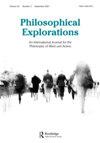Know thyself: bipolar disorder and self-concept
IF 1.1
3区 哲学
0 PHILOSOPHY
引用次数: 2
Abstract
ABSTRACT This paper addresses an important yet neglected existential issue sometimes faced by persons with bipolar disorder (BD): confusion about the extent to which what one is like is influenced by BD. Although such confusion is common in psychiatric illnesses, BD raises idiosyncratic difficulties due to its intricate interactions with personality, cognition and behavior. The fluctuating mood phases of BD can generate inconsistency in one's self-experience and sense of self. One way to resolve this confusion would be to coherently account for BD within one's overall self-concept. To facilitate this task, this paper introduces a heuristic taxonomy of different relationships wherein BD can be viewed in light of self-related beliefs. The relationships are as follows: (1) BD contributes to the self, (2) BD scaffolds the self, (3) BD gradually becomes part of the self and (4) BD is not part of the ‘real self’. As the individual presentation of BD varies extensively, the type of relationship one feels holds true depends on one's personal experience of managing and living with the disorder. These relationships act as an organizing framework for one's self-related beliefs about how to account for the effects of BD on personality, behavior, cognitive patterns and other self-expressions.了解你自己:双相情感障碍和自我概念
本文探讨了双相情感障碍(BD)患者有时面临的一个重要但被忽视的存在问题:关于一个人的样子在多大程度上受到双相情感障碍的影响的困惑。尽管这种困惑在精神疾病中很常见,但由于其与人格、认知和行为的复杂相互作用,双相情感障碍带来了特殊的困难。双相障碍的情绪波动阶段会导致自我体验和自我意识的不一致。解决这种困惑的一种方法是在一个人的整体自我概念中连贯地解释双相障碍。为了促进这项任务,本文介绍了一种启发式的不同关系分类法,其中BD可以根据自我相关信念来看待。这些关系如下:(1)双相障碍有助于自我;(2)双相障碍为自我搭建了脚手架;(3)双相障碍逐渐成为自我的一部分;(4)双相障碍不是“真实自我”的一部分。由于双相障碍的个体表现差异很大,一个人所感受到的关系类型取决于一个人管理和生活在这种障碍中的个人经历。这些关系作为一个自我相关信念的组织框架,关于如何解释双相障碍对人格、行为、认知模式和其他自我表达的影响。
本文章由计算机程序翻译,如有差异,请以英文原文为准。
求助全文
约1分钟内获得全文
求助全文

 求助内容:
求助内容: 应助结果提醒方式:
应助结果提醒方式:


